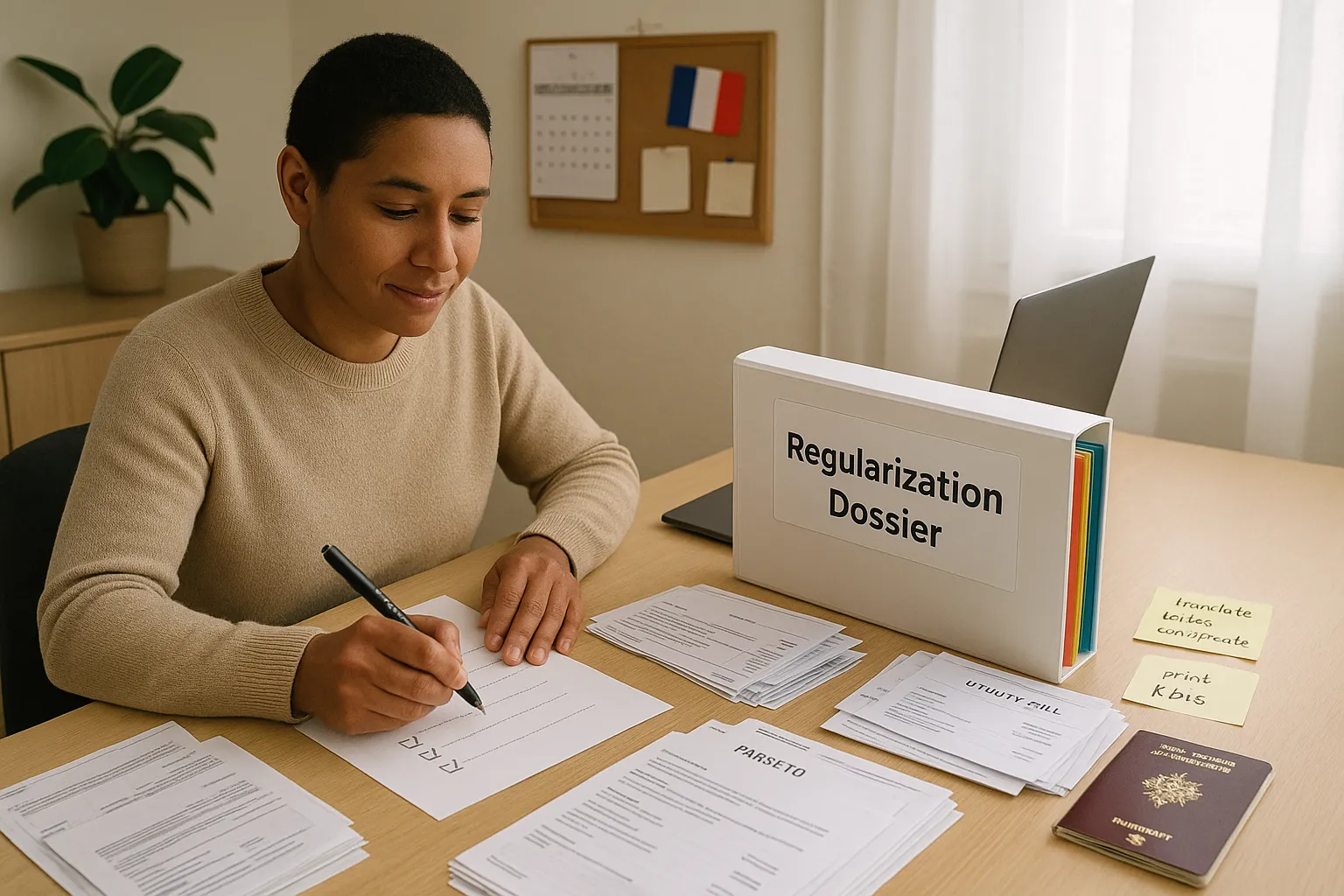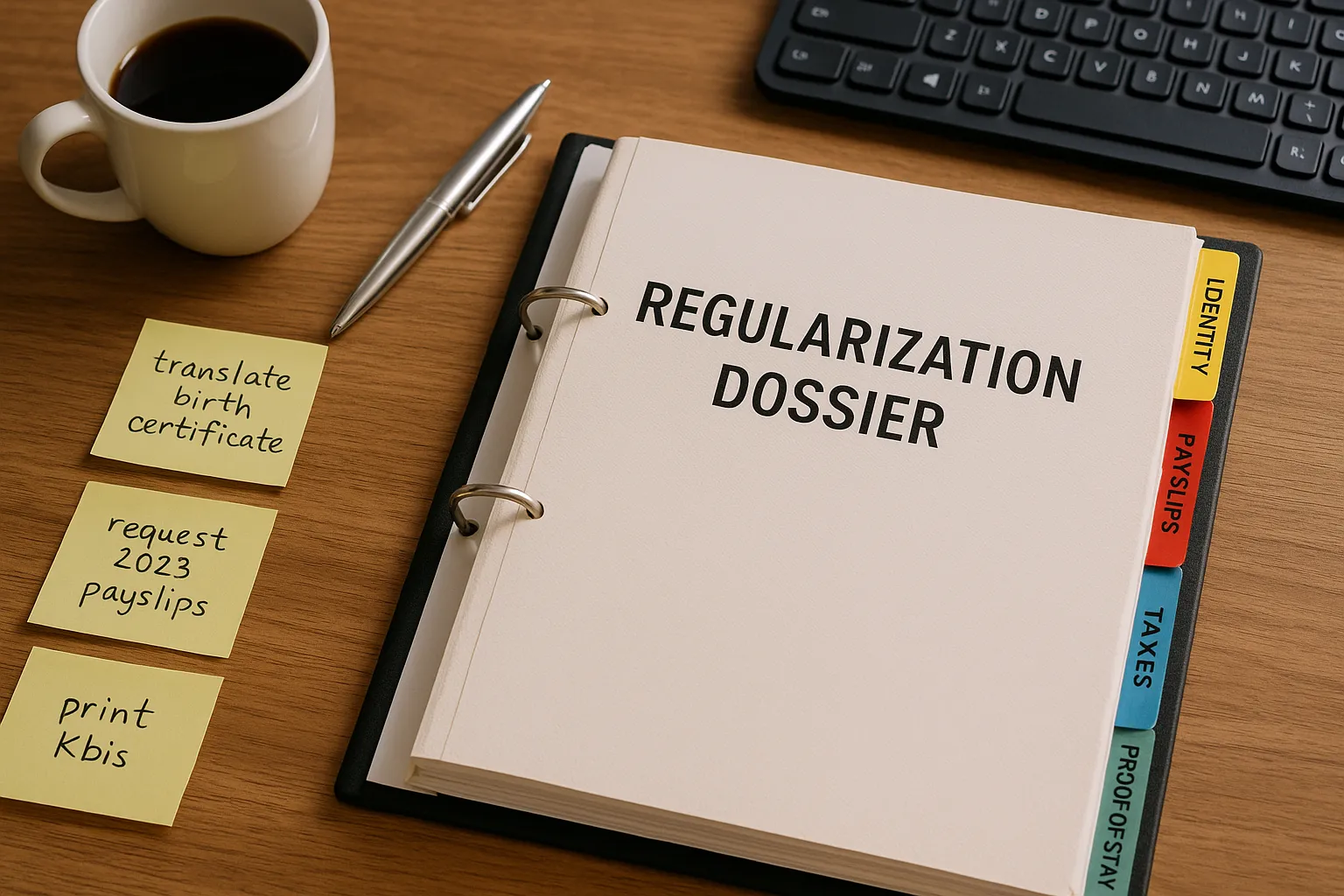From Undocumented to Documented: Step-By-Step Regularization Through Employment

Why consider regularization through employment in 2025?
Living and working in France without papers is stressful: no stable contract, no health coverage, the fear of an identity check on the way to work. Yet every year several thousand undocumented workers obtain a residence permit thanks to their job. The procedure is called Admission exceptionnelle au séjour pour raison professionnelle (exceptional admission to stay for professional reasons), often shortened to “regularization through work”.
In January 2024, the French Parliament revised the immigration law, creating a new temporary residence permit for workers in shortage occupations (titre de séjour « métiers en tension »). Whether you fall under the classic scheme or this new track, the steps below will help you build a solid case in 2025.
Good to know: being employed illegally does not automatically lead to deportation. French labor law recognizes the reality of undeclared work and, under strict conditions, allows you to turn your job into a legal status.
1. Check if you meet the main eligibility criteria
The prefecture has a margin of discretion, but case law and circulars (especially the Valls circular of 28 November 2012, still used as a guideline) provide a framework. You generally need to prove:
- Continuous presence in France: at least 3 years (sometimes 5) with supporting evidence such as stamped passport pages, transport tickets, medical bills, bank withdrawals, or dated photos.
- Employment history: 8 to 24 payslips in the last 24 months, depending on the department. Multiple employers are accepted if the total hours are coherent.
- A job offer or work contract: a CDI (open-ended contract) or a fixed-term contract (CDD) of at least 6 months, signed by an employer willing to support your application.
- No serious criminal record: minor traffic fines will not block you, but repeated offenses or identity fraud can.
New « métiers en tension » permit
If you work in one of the nationally recognized shortage occupations (hospitality, construction, agri-food, personal care, IT, etc.), the minimum presence requirement is now 3 years with at least 12 months of payslips over the past 24 months. The employer does not have to pass the usual labor market test, making approval quicker.
2. Collect every piece of evidence of your stay and work
Being methodical is half the battle. Start an electronic folder and a physical binder with clear tabs:
- Identity: passport, birth certificate (+ sworn translation if not in French).
- Proof of entry: visa, entry stamp, or travel tickets.
- Proof of continuous presence: housing leases, electricity bills, money transfer receipts, school certificates for children.
- Employment: original payslips, attestations d’emploi, bank statements showing salary payments.
- Tax and social contributions: URSSAF declarations (if the employer made them) or sworn statements.
- Employer documents: signed job offer, Cerfa 15186-03 form, company registration (KBIS), last tax return.

Tip: Photos of envelopes showing your name and French address are accepted as proof of presence. Print them on A4 paper and write the date underneath.
3. Secure your employer’s commitment
Regularization is impossible without an employer willing to play the game. Explain that:
- The company will need to sign the Cerfa 15186-03 (or 15619-01 for seasonal work) and pay a fee to OFII after approval. The amount ranges from 55 € to 300 €, depending on the contract duration.
- Any previously unpaid social contributions will become due, but URSSAF often allows staged repayment.
- Hiring you legally eliminates the risk of heavy fines for undeclared work.
If your employer hesitates, suggest calling ImmiFrance for a confidential assessment or reading the official FAQ on service-public.fr.
4. Book a prefecture appointment – even if slots are scarce
Most prefectures use online portals where slots open randomly. Persistence is key:
- Refresh the booking page early mornings and late at night.
- Use different browsers and clear cookies.
- Politely request help from a local association (Cimade, GISTI) that may have dedicated channels.
ImmiFrance offers prefecture appointment assistance as part of its residence-permit support service, saving you weeks of uncertainty.
5. Prepare for the day of submission
Bring two complete copies of your dossier plus the originals. The officer will usually:
- Check your identity and take fingerprints.
- Review your contract, payslips, and employer form.
- Issue a Récépissé valid for 4 to 6 months, which immediately authorizes you to work.
If anything is missing, you will receive a request (complément de dossier) with a deadline, typically 30 days.
Possible interview questions
- How did you enter France?
- Where have you lived since arrival?
- Describe your current job tasks and working hours.
- Why didn’t you apply for a visa before coming?
Answer briefly and honestly; inconsistencies can hurt your credibility.
6. What happens after submission?
- Labor inspection opinion – optional: The prefecture may consult the regional labor authority (DREETS). This adds 2 to 8 weeks.
- Security checks – automatic.
- Decision:
- Positive: you receive a SMS/e-mail to collect your card (titre de séjour) after paying a tax stamp (225 € for a one-year "salarié" card, 75 € for the 1-year "métiers en tension" permit).
- Negative: you may receive an OQTF (order to leave French territory). You have 30 days (sometimes 15) to file an appeal with the administrative court.
Average processing time in 2025 is 4 to 7 months, but Paris, Seine-Saint-Denis, and Rhône can take longer.
7. If your application is refused
Do not panic. Many refusals are overturned by judges, especially when the prefecture ignored solid work evidence. Actions you can take:
- Administrative appeal (recours gracieux ou hiérarchique). Low cost, but does not suspend the OQTF deadline.
- Judicial appeal before the administrative court. You must detail factual errors and legal breaches (e.g., misinterpretation of Article L.435-1 CESEDA).
- Request legal aid (aide juridictionnelle) if your income is below the threshold.
ImmiFrance can connect you to partner lawyers specialized in immigration litigation – book a first consultation here.
8. After you receive your residence permit
Congratulations, you’re now documented! Remember to:
- Register for Ameli to get health insurance.
- Declare income to the tax office (even if zero) – essential for future renewals and naturalization.
- Renew your permit 2 to 4 months before it expires. Keep collecting payslips; renewal is largely automatic if you stay employed.
- Consider the path to a 4-year "Passeport Talent" or, after 5 years of legal stay, apply for the 10-year resident card.

9. Frequently asked questions
Can I change employers while my dossier is pending?
Yes, but notify the prefecture with the new contract and payslips to avoid doubts about the continuity of employment.
What if my employer refuses to help?
You can still apply by showing previous payslips and a future job promise from another company. Prefectures value current employment more, but they do not require the same employer who provided the payslips.
Does paying taxes help?
Absolutely. Filing an impôt sur le revenu declaration, even with zero tax due, shows integration and financial transparency.
I only have cash payslips (bulletins de paie papier) without social contributions. Are they valid?
They count as evidence, but the prefecture may demand proof the employer paid contributions. URSSAF can issue a regularization statement if the employer cooperates.
Can family members benefit from my regularization?
Not automatically. Spouses and minor children may later apply for the "private and family life" permit once you hold a legal status and meet income thresholds.
10. How ImmiFrance simplifies the journey
- Personalized eligibility assessment within 24 hours.
- Secure document checklist in your dashboard and real-time case tracking.
- Prefecture slot booking and file preparation.
- Direct line to a network of specialized immigration lawyers for complex cases or appeals.
Ready to move from uncertainty to stability? Start your regularization process with experts who understand both the law and the human stakes.
👉 Request your free pre-evaluation and take the first concrete step toward a documented life in France.
Information accurate as of 18 July 2025. Immigration rules can change; always verify the latest requirements with your prefecture or a qualified professional.
